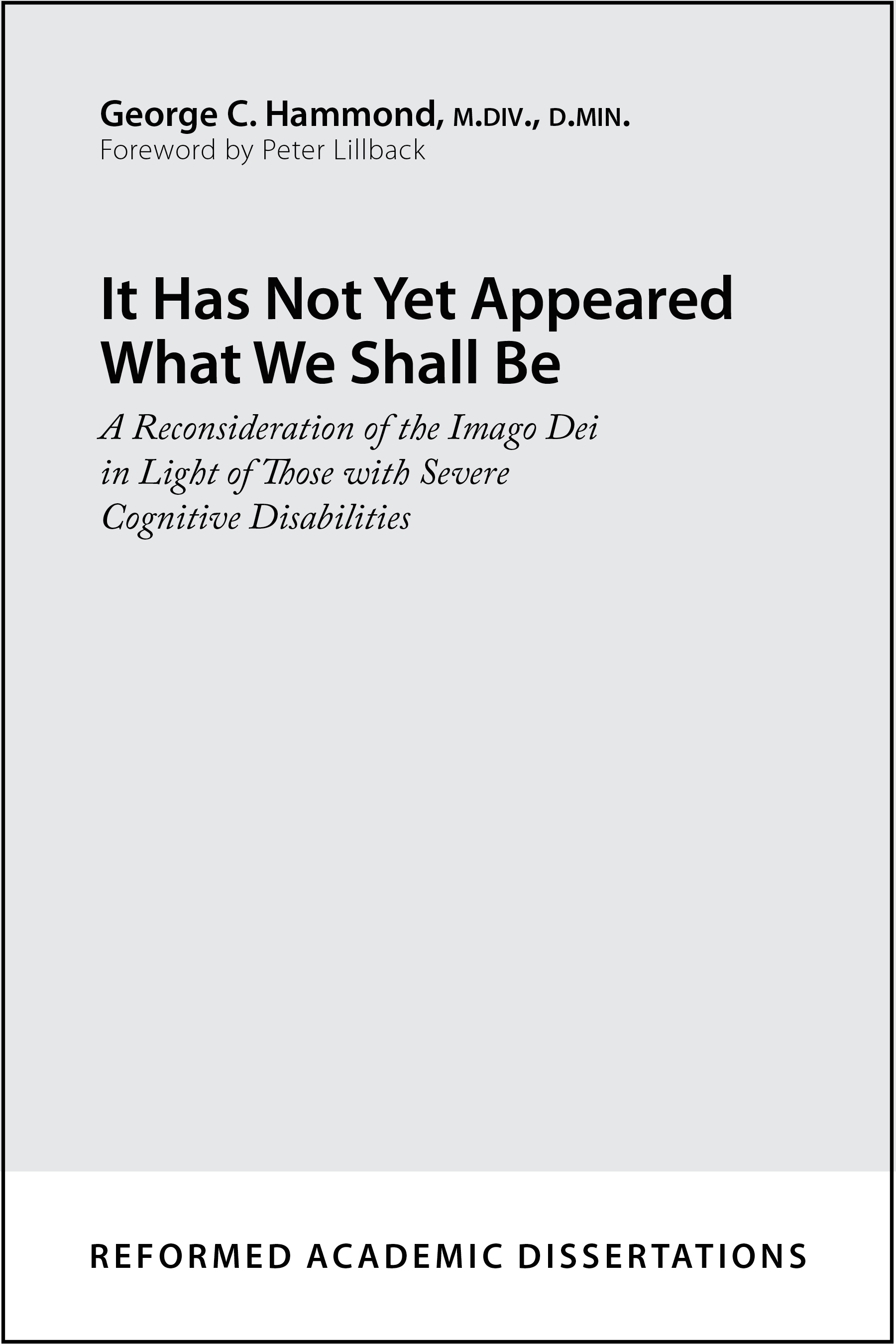This week’s author interview is with George Hammond. He is the author of the Reformed Academic Dissertation, It Has Not Yet Appeared What We Shall Be: A Reconsideration of the Imago Dei in Light of Those with Severe Cognitive Disabilities.
- Question #1—Tell us a little bit about yourself: where you’re from, family, job, personal interests, unique hobbies, what you do in your spare time, etc.
I grew up in a very pleasant New Jersey suburb of New York City. My childhood home was idyllic, loving and nominally Roman Catholic, but without any real faith. Christian friends told me about the gospel, and I became a disciple of Jesus when I was nineteen while studying psychology at William Paterson University.
God’s given me a wonderful life’s companion. Donna is the most beautiful woman I have ever met, inside and out, and I sometimes marvel that she’s put up with me all these years. God’s given us four great children. My older son is a senior at George Mason University. His sister, next in line, is taking her prerequisites and exams to enter a physical therapy program at Northern Virginia Community College. My younger son and next in line is a high school senior and is looking forward to studying computer science and software engineering. Rebecca, our youngest, who was the impetus for my book will contend with her disabilities her whole life and will never be able to live on her own or take care of herself.
I’m currently the pastor of Bethel Presbyterian Church in Leesburg Virginia, a congregation of loving, joyful, serious-minded Christ-followers. My interests are varied and wide-ranging. I’ve worked in sales for the aerospace industry, as a college admissions director, and as a firearms instructor. I was at one time and now am again serving as a Police Chaplain. I ran a father-son self-defense program for thirteen years in which physical conditioning and self-defense techniques were used as a parable to teach spiritual lessons to encourage men and boys (“men in training”) to fight the good fight of faith. I’m also currently a teaching fellow for the C.S. Lewis Institute’s Fellows Program, and for the last three years I’ve played drums with a local jazz band.
Some of these positions are remunerated, others are not. All of them provide an opportunity to make friends of strangers, and my hope and prayer is that some of these new friends will become followers of Jesus.
- Question #2—Which writers inspire you?
I like to read all sorts of things, but I suppose the things I gravitate toward the most are those books in which the data are carefully researched, and the propositions are carefully and logically argued. Right now my favorite author is Herman Bavinck. I also like to read John Murray, B.B. Warfield and Charles Hodge.
- Question #3—What inspired you to write this book, about this topic?
Throughout the history of the church, the doctrine of the image of God has been conceived of in a way that would exclude those with severe cognitive disabilities. Martin Luther opined that people with severe intellectual disabilities should not be baptized because they are “only animal life,” and “lumps of flesh without a soul.” Gordon Clark opined that the image of God is reason. One of his followers, John Robbins, attended my church for several years. Based on his commitment to Clark’s philosophy, Robbins was adamant that those born with cognitive disabilities were beyond redemption and could not be saved. I intuitively recoiled from these ideas, but was only internally prodded to consider the issue carefully when my daughter was born with severe, incurable, life-long cognitive disabilities.
- Question #4—Do you have a specific spot where you enjoy writing most?
I never really thought about it, but I suppose it would be the dining room table when everyone else is out of the house.
- Question #5—At what time of day do you write most?
Mornings are my best thinking time. By 2:00 PM, there are diminishing returns in trying to accomplish anything that requires thought. You can’t plan for inspiration, though. There are times I’ve written through dinner, and times I’ve gotten up in the middle of the night.
- Question #6—How do you deal with writer’s block?
Powering through it is not the answer. I need to distract my mind. I’ll get up and go for a walk, cut the grass, play some music, or do something that is not related to syllogistic thinking. I often find that after doing so, when I get back to it the thoughts come more easily and cogently.
- Question #7—If you have a favorite book of the Bible, what is it and why?
That’s tough. I look at the Bible as a unified story, and so the individual books are like chapters, or major sections in the story. I like best whatever I’m reading at the time. I suppose the book I come back to again and again is Ecclesiastes. I’ve come to love it and find comfort in it because it does not sugar-coat what life is like in a world estranged from God.
Bethel Presbyterian Church’s website: http://bethelpres.com
Bethel Presbyterian Church’s Facebook page: https://www.facebook.com/BethelPres/



Stan Galorenzo
-Chip,
This was a very nice interview. It sounds like you are doing amazing things these days.